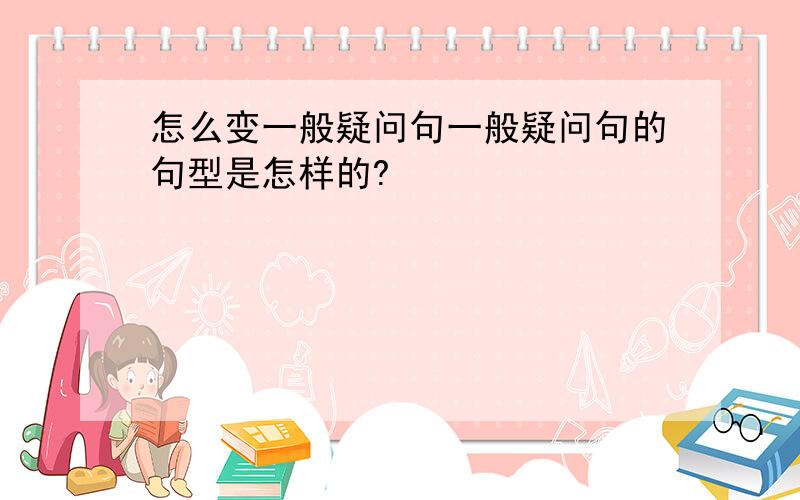怎么变一般疑问句一般疑问句的句型是怎样的?
来源:学生作业帮助网 编辑:作业帮 时间:2024/11/05 18:53:00

怎么变一般疑问句一般疑问句的句型是怎样的?
怎么变一般疑问句
一般疑问句的句型是怎样的?
怎么变一般疑问句一般疑问句的句型是怎样的?
先找系动词be:am,is,are,was,were.找到后提前变人称(第一人称变第二人称,第三人称不变)加问号.例:you are a pupil变Are youa pupil?2· 找不到系动词再找情态动词:can may must will shall need could should would might 找到后变人称(第一人称变第二人称,第三人称不变)加问号.例:They will go to school.变Will they go to school?
A. 请同学们记住以下单词:
1、be动词的五种形式:am, is, are, was, were;
2、情态动词:can, could, may, might, must, shall, should, will,would, need, had better
3、助动词:have, has, had
B. 一般疑问句基本结构为:
Be动词或助动...
全部展开
A. 请同学们记住以下单词:
1、be动词的五种形式:am, is, are, was, were;
2、情态动词:can, could, may, might, must, shall, should, will,would, need, had better
3、助动词:have, has, had
B. 一般疑问句基本结构为:
Be动词或助动词或情态动词 + 主语 + 谓语 + 动词 + 其他+?
C. 变一般疑问句的口诀有二: 1. 一调二改三问号; 2. 一找二改三问号。
D. 具体方法如下:
一、be动词,情态动词和助动词直接调到主语前
原句中含有be动词(am, is, are, was, were) 和情态动词(can, shall, will, may, should, would, might, had better等)时,把他们直接调到主语前。如:
He teaches English.---- Does he teach English?
1. He is a teacher. →Is he a teacher?
2. Li Lei can speak English. →Can Li Lei speak English?
3. They will go to the aquarium if it is fine tomorrow. → Will they go to the aquarium if it is fine tomorrow.
4. There were many students in the classroom. →Were there many students in the classroom?
二、原句中没有be动词、助动词或情态动词时,要根据下面不同情况在主语前加助动词do, does, did。
1. 句中第一个动词是原形时,在主语前加上do。如: I get to school at six o'clock every day. → Do you get to school at six o'clock every day?
2. 句中第一个动词是三单形式时,在主语前加上does,原来的动词三单形式改为动词原形。如:
He teaches English. → Does he teach English?
3. 句中第一个动词是过去式时,在主语前加上did,原来的动词过去式改为动词原形。如:
The children had a good time in the park last night. → Did the children have a good time in the park last night?
三、肯定句变一般疑问句的几点注意
1. 肯定句变一般疑问句时,除上述变化外,句中其他词语也可能随之改变,如将some改为any,something改为anything, my改为your, I改为you,already、still改为yet等。如:
There are some apples in the tree.。 →Are there any birds in the tree? The dentist has already seen the moive. →Has the dentist seen the moive yet?
2. 需要分清do, does, did, have, has, have, had等是实义动词还是助动词。如果是助动词,则把它们直接调到主语前,如果是实义动词,则在主语前面根据实际情况加do, does或did。如:
Mary usually does some reading on Saturdays.
→Does Mary usually any reading on Saturdays?(Wrong)
→Does Mary usually do any reading on Saturdays?(Right)
I have taught English here for two years
→Do you have taught English here for two years?(Wrong)
→Have you taught English here for two years?(Right)
收起